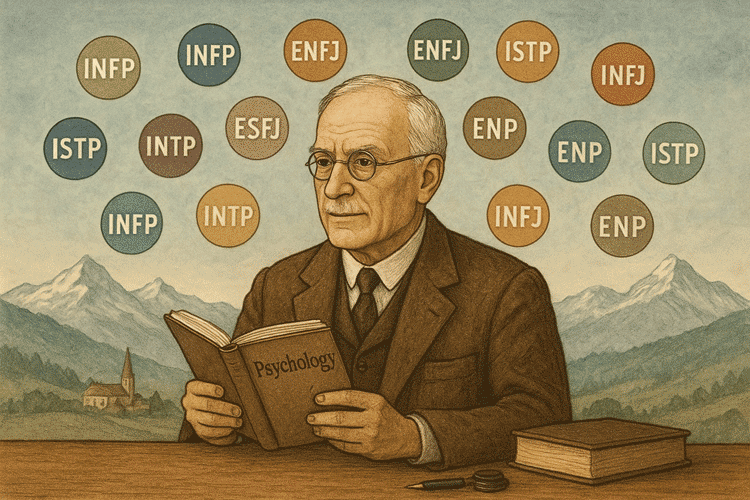What MBTI Type Was Carl Jung? A Deep Dive
Carl Jung’s personality and psychological theories are often linked with modern MBTI discussions, and the central question “what MBTI type was Carl Jung” has fascinated scholars, psychologists, and MBTI enthusiasts for decades.
Introduction
The Myers-Briggs Type Indicator (MBTI) is one of the most widely recognized personality frameworks in the world, and it was heavily inspired by the groundbreaking work of Carl Gustav Jung. Yet, an ongoing debate among psychologists and MBTI enthusiasts revolves around a crucial question: what MBTI type was Carl Jung? Determining his MBTI type is not merely a curiosity; it also sheds light on how his theories emerged, how he processed information, and how he related to the world. In this comprehensive exploration, we will delve into Jung’s life, his writings, his theories, and his possible MBTI classification.
This article will address the keyword “what MBTI type was Carl Jung” in detail, ensuring clarity for both psychology enthusiasts and SEO optimization purposes.
Carl Jung’s Legacy and the MBTI Connection
Carl Jung (1875–1961) was a Swiss psychiatrist and psychoanalyst who founded Analytical Psychology. His work influenced not only psychology but also literature, art, philosophy, and even spirituality. Jung’s theories on archetypes, the collective unconscious, and psychological types provided the very foundation upon which Katharine Cook Briggs and Isabel Briggs Myers built the MBTI.
So when we ask “what MBTI type was Carl Jung,” it is essential to understand that MBTI itself is derived from Jung’s typology. Thus, identifying Jung’s MBTI type is both symbolic and practical in understanding his intellectual heritage.
Understanding Jung’s Typology
Before directly addressing the question “what MBTI type was Carl Jung,” we must first revisit his typology framework. Jung categorized people based on their orientation of energy (introversion vs. extraversion), their dominant function (thinking, feeling, sensing, or intuition), and whether they preferred perception or judgment.
Introversion (I) vs. Extraversion (E) Thinking (T) vs. Feeling (F) Sensing (S) vs. Intuition (N)
These combinations created the basis for MBTI’s 16 types. Therefore, asking “what MBTI type was Carl Jung” is like asking how the creator himself fit into the system that he inspired.

Evidence for Jung as an INFJ
One of the most popular arguments in answering “what MBTI type was Carl Jung” is that he was an INFJ. This type, often called the Advocate, aligns closely with Jung’s introspective, visionary, and analytical tendencies.
Reasons Jung Might Be INFJ:
Introversion (I): Jung preferred solitude and deep reflection, often retreating into his own world of imagination and symbols. Intuition (N): His focus on archetypes, symbolism, and the collective unconscious shows an orientation toward abstract patterns. Feeling (F): Although analytical, Jung cared deeply about human meaning, individuation, and personal growth. Judging (J): His structured theories and organized frameworks suggest a Judging preference.
Thus, for many scholars, the answer to “what MBTI type was Carl Jung” is that he was an INFJ, a type known for visionary insight and pioneering ideas.
Evidence for Jung as an INTP
Others argue that Jung fits better as an INTP—the Thinker or Logician. This perspective influences another layer of the debate over “what MBTI type was Carl Jung.”
Reasons Jung Might Be INTP:
Introversion (I): Like INFJs, INTPs thrive in solitude, where Jung did much of his writing. Intuition (N): His conceptual approach aligns well with the abstract focus of INTPs. Thinking (T): Jung’s analytical rigor and logical system-building suggest a thinking preference over feeling. Perceiving (P): INTPs are flexible, curious, and often prefer exploration over rigid structure—Jung himself often revised his theories and explored many different avenues.
Thus, some argue that the truest answer to “what MBTI type was Carl Jung” is INTP, given his love for intellectual exploration.
Other Possible Classifications
Beyond INFJ and INTP, a few other types have been proposed in discussions about “what MBTI type was Carl Jung.” These include:
INTJ: Known as the Mastermind, INTJs are visionary system-builders, much like Jung who constructed an entire psychological framework. INFP: Jung’s deep sensitivity to human experience and meaning also resonates with INFP characteristics.
Still, the two dominant debates in “what MBTI type was Carl Jung” remain centered around INFJ and INTP.
Analyzing Jung’s Writings
When exploring “what MBTI type was Carl Jung,” it is crucial to look at his writings directly. Jung’s works such as Psychological Types (1921) and Man and His Symbols reveal his thought processes.
His exploration of symbolism supports the INFJ argument. His philosophical depth supports the INTP argument. His balance of rational structure and visionary intuition suggests that Jung’s MBTI type could lie at the intersection of INFJ and INTP traits.
Thus, any answer to “what MBTI type was Carl Jung” should acknowledge this complexity.
Jung’s Personality in Daily Life
Biographical accounts further inform the debate on “what MBTI type was Carl Jung.”
He was described as reserved and thoughtful (Introvert). He had profound dreams and visions, aligning with Intuition. His theories emphasized meaning, archetypes, and inner transformation, pointing toward Feeling. Yet, his systemic analysis of psychology reflects Thinking.
This duality complicates the answer to “what MBTI type was Carl Jung,” making it reasonable to argue for both INFJ and INTP possibilities.
Why “What MBTI Type Was Carl Jung” Matters
Some might dismiss the question “what MBTI type was Carl Jung” as trivial, but it is essential for three reasons:
Historical Insight: Understanding his type helps contextualize how he formed his theories. Theoretical Reflection: Since MBTI originates from Jung’s work, exploring his type strengthens our understanding of the framework. Practical Curiosity: Many MBTI enthusiasts seek to connect with Jung personally, finding inspiration in his potential type.
Thus, the question “what MBTI type was Carl Jung” is more than speculative—it is a gateway to deeper comprehension.
Final Conclusion
So, what MBTI type was Carl Jung? While no definitive answer exists, the strongest contenders are INFJ and INTP. Jung embodied qualities of both types: the visionary, meaning-seeking INFJ and the intellectually rigorous, exploratory INTP.
Perhaps the truest conclusion is that Jung transcends MBTI categorization. After all, he laid the foundation for MBTI itself, and his multifaceted nature resists being boxed into a single label. Still, for practical discussions, most enthusiasts lean toward the belief that the best answer to “what MBTI type was Carl Jung” is INFJ.
Many scholars and MBTI enthusiasts believe Carl Jung was an INTP or INFJ. His deep theoretical exploration, love of abstract concepts, and independent thinking suggest INTP traits, while his visionary outlook and profound insights into human behavior also align with INFJ characteristics. The debate continues, but both types highlight his intellectual depth and originality.
The debate arises because Jung exhibited qualities of multiple MBTI types. His logical, analytical side points to INTP, while his ability to connect abstract ideas to human meaning resonates with INFJ. Since Jung himself never used MBTI (it was later developed based on his theories), typing him is interpretative rather than factual.
Asking this question helps us understand the foundations of MBTI and how Jung’s theories continue to shape personality psychology. It also demonstrates that personality cannot always be reduced to one fixed type, especially in complex thinkers like Jung. Exploring his potential MBTI type encourages deeper reflection on how psychological frameworks evolve.





